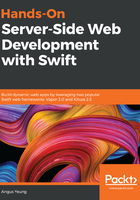
Using controller for logical operations
For simplicity, your myJournal application persists data in memory. You'll use database operations for permanent data storage later on.
Even though you are not using a database operation, you'll implement the typical Create, Read, Update, and Delete (CRUD) operations for your data. Create the JournalController.swift file in the /Sources/App/Controllers directory:
// Journal controller
import Vapor
final class JournalController {
var entries : Array<Entry> = Array() // [1]
//: Get total number of entries
func total() -> Int { // [2]
return entries.count
}
//: Create a new journal entry
func create(_ entry: Entry) -> Entry? { // [3]
entries.append(entry)
return entries.last
}
//: Read a journal entry
func read(index: Int) -> Entry? { // [5]
if let entry = entries.get(index: index) {
return entry
}
return nil
}
//: Update the journal entry
func update(index: Int, entry: Entry) -> Entry? { // [6]
if let entry = entries.get(index: index) {
entries[index] = entry
return entry
}
return nil
}
//: Delete a journal entry
func delete(index: Int) -> Entry? { // [7]
if let _ = entries.get(index: index) {
return entries.remove(at: index)
}
return nil
}
}
extension Array {
func get(index: Int) -> Element? { // [4]
if index >= 0 && index < count {
return self[index]
}
return nil
}
}
The journalController class performs the following operations:
- Declares an array to hold all the instances of Entry in memory
- Returns the number of entries in the array
- Appends a new Entry item to the array
- Adds a safe get(index:) function to the Array extension that checks for bounds
- Retrieves an Entry item identified by a zero-based index from the array
- Replaces a current item in the array with the supplied Entry item
- Deletes an item from the array
An array in [1] will be used as in memory persistence and holds the references for all Entry instances. The total() method in [2] gives out the total number of entries in the array. In [4], a safe get(index:) function is implemented as an extension to Array. It checks for the given index against the bounds of entries array. The functions in [3], [5],[6] and [7] implement the CRUD operations on the array.